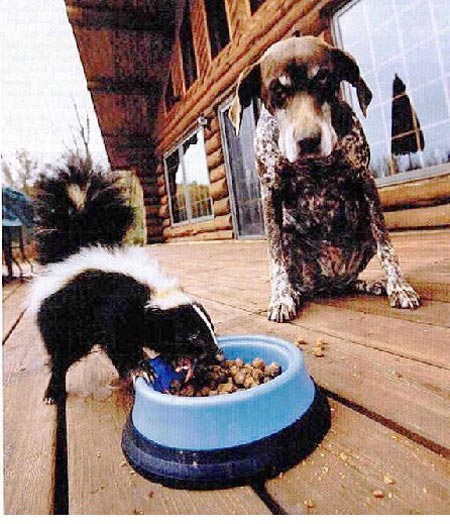Two of the greatest virtues that humans can possess are patience and wisdom. The following photograph illustrates how the two virtues can be reluctantly brought together. Given the expression of utter frustration on the dog’s face, I am confident that the dog did not learn the patience and wisdom needed in this situation from a stint in obedience school. He knew that he had to give that skunk a wide berth and access to the food bowl. Most likely, he learned the lesson in the experiential school of hard knocks.
What’s the relationship among experience, wisdom and patience? Three quotes may help us.
1. By three methods, we may learn wisdom: fIrst by reflection, which is noblest; second by imitation; which is easiest; and third by experience which is the bitterest.” (Confucius)
The expression on the dog’s face reflects a very bitter experience. It certainly helped the dog learn the wisdom of not crossing a skunk.
2.“All human wisdom is summed up in two words: wait and hope.” (Alexandre Dumas).
Although the word patience is not present in the Dumas quote, the close synonym “wait” is front and center. Obviously in the picture, the dog is waiting for the skunk to finish its meal, and hoping that there will be some food left.
3. “Experience is not what happens to you; it’s what you do with what happens to you.” (Aldous Huxley)
Your experiences are not the events that swirl around you. They are the lessons that you learn and appropriate.
To summarize the importance of wisdom, let us go to one of the wisest individuals to ever live. Listen to King Solomon:
Wisdom is the principal thing; therefore get wisdom: and with all thy getting get understanding. (Proverbs 4:7 KJV)
I was drawn to the above picture for two reasons. The first reason is my recent experiences with skunks. Since my TBI’s in 2009, I have only smelled the telltale aroma of a skunk once. I no longer “smell” skunks. I see skunks. This is one of my dysesthesia (cross-sensory perceptions). When the aroma of a skunk is in the air, it causes me to see the vision of a dead skunk on an unidentified road. This particular dysesthesia has its own advantage. It protects me from a very unpleasant odor.
The only time I smelled a skunk is another story. One day as my wife and I were riding in our car. I “really” saw a dead skunk along the side of the road. Suddenly, I smelled the pungent aroma. I exclaimed to my wife, “Well, what do you know, I smelled that skunk!” She hesitantly replied, “Honey, I’m sorry but there’s no skunk odor.” She continued by saying that she saw the dead skunk and was very surprised that there was no aroma emanating from it. So instead of ridding myself of this particular cross-sensory perception, I had picked up another hallucination. My memory of skunks had kicked in. The sight of the dead skunk triggered the repressed memory of a non-existent odor.
The second reason this picture fascinated me was the fact that it reminded me of the pet dog I had for 17 years, as I grew up. All he needed was one encounter with a skunk that he had when he was still a puppy. He never messed with one again. Experience was a great teacher, and my dog learned well. Although he was a small fox and rat terrier mix-breed, he was feisty and very jealous of his domain. He was accustomed to chasing any four-legged creature no matter how big or fierce that dared to venture into our yard, except skunks. It was funny watching him trying to herd the cows from our neighbor’s farm back into their own pasture. I often wish I had the foresight to capture the looks of shame and resignation on the faces of the cows as they slowly meandered back into their pasture, and the look of joyful victory on the face of my dog as he barked a couple of taunting “Goodbye and good riddance” from his side of the fence. He had proudly defended his territory again. He had no fear of huge cows, but he steered clear of skunks.
All of this reminded me of a quote about learning that is usually attributed to Mark Twain: “A man who carries a cat by the tail learns something he can learn in no other way.” Please believe, I am not advocating carrying a polecat by the tail unless you want to learn something you and anyone else who comes in contact with you with never forget. I may not be able to “really” smell a skunk now. However, I do remember what their odor smells like, and I do not wish to tempt my sensory perceptions that far.
